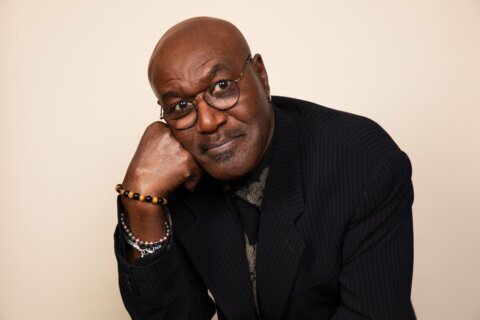What would you do if a magical machine revealed your true life potential? Would you suddenly change your career to pursue your supposed destiny? Or would you be content with the life you have already built by chance?
That’s the high-concept premise of the new 10-episode streaming series “The Big Door Prize,” an intriguing existential dramedy that drops the finale of its first season this Wednesday on Apple TV+.
Based on the 2020 book of the same name by M.O. Walsh, the story is set in the small fictional town of Deerfield, where a mysterious machine called The Morpho appears in a convenience store with a haunting blue glow. Curious citizens scan their fingerprints and enter their social security numbers, allowing the machine to spit out blue cards reading their “Life Potential.” Will the town residents upend their daily lives to pursue their supposed destinies?
Chris O’Dowd, who played Kristen Wiig’s cop love interest in “Bridesmaids” (2011) and won an Emmy for the British comedy series “State of the Union” (2019), is perfectly cast as the mopey, middle-aged high-school history teacher Dusty. He turns 40 in the pilot and receives a bunch of gifts that he doesn’t want, including a Theremin, before drawing a Morpho card that reads “Teacher/Whistler,” deciding that he is pretty much on the right path.
The opposite is true for Dusty’s wife Cass (Gabrielle Dennis), who draws the card “Royalty,” wondering if she settled for small-town life when she could have been a real-life queen or princess somewhere. Her performance is outwardly energetic, cheering at basketball games and emceeing social events, but inwardly chaotic, never feeling good enough for her overbearing mother Izzy (Crystal R. Fox), a knick-knack store owner who is also the town mayor.
The parents’ mid-life crises are nothing compared to the trauma facing their daughter Trina (Djouliet Amara), who is grieving the death of her high-school boyfriend Kolton Kovac, the town basketball star who died in a freak car accident. Helping her grieve is Kolton’s shy brother Jacob (Sammy Fourlas), whose broken father Beau (Aaron Roman Weiner) turns his garage into a whiskey bar with a mechanical punching bag to let out his anger.
Rounding out the cast are Italian restaurant owner Giorgio (Josh Segarra), who pathetically expresses his love for Cass every three seconds; Father Reuben (Damon Gupton), who converted into a minister based on his Morpho card but clearly has feelings for the local bartender Hana (Ally Maki), a drifter who showed up around the time that the Morpho machine arrived in the convenience store owned by the quirky Mr. Johnson (Patrick Kerr).
Many of these characters get their own namesake episodes (“Dusty,” “Cass,” etc) sketching character studies from their perspective. The only exception is the two-part finale “Deerfest,” which centers on an annual town carnival rife with visual metaphor, such as Izzy building a hay-bale maze higher as she builds her emotional walls higher. There’s even an albino deer like the symbolic coyote in “Collateral” (2004).
Showrunner David West Read previously executive produced “Schitt’s Creek” (2015-2020), but comparisons do a disservice to “The Big Door Prize,” which isn’t nearly as hilarious or socially groundbreaking. More literal viewers may be disappointed that we never learn the exact origins of the Morpho machine.
I’m sure the writers would say that’s not really the point. Like the Zoltar machine that transforms Tom Hanks in Penny Marshall’s “Big” (1988), the Morpho machine is merely a high-concept catalyst to explore larger existential themes of fate vs. free will. It’s a proverbial “MacGuffin” that the characters try to solve but that the writers don’t bother revealing to the audience, save for a few clues as we cut to black in the cliffhanger.
The series has already been renewed for a second season, but who knows when it will drop due to the writers’ strike. Among Apple’s slate, I’d recommend “Ted Lasso,” “Trying” or “Shrinking” first, but if you’ve already knocked those out, give it a shot. Watching “The Big Door Prize” is like drawing a Morpho card — it might not be what you think you’re gonna get, but it might just be what you need to improve your life.









